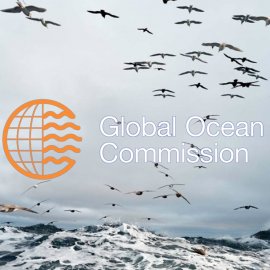Rescue for the Global Ocean, Part 4
-
English
-
ListenPause
I’m Peter Neill, Director of the World Ocean Observatory. This edition of World Ocean Radio addresses the concluding recommendations from the new Global Ocean Commission report, From Decline to Recovery – A Rescue Package for the Global Ocean, Proposal 7, Global Ocean Accountability Board – Monitoring Progress toward a Healthy Ocean, and Proposal 8, Creating a High Seas Regeneration Zone. How do all these recommendations move forward? Who accepts responsibility for the larger, integrated actions that may transcend the individual mandate of the many other existing ocean agencies and national governments? This has been a critical problem in the past, a large vision that is not realized as a result of fragmented interest, funds, and jurisdictions. Thus, the Commission recommends “the establishment of an independent Global Ocean Accountability Board, an independent body that would monitor and assess whether sufficient progress is being made towards achieving the proposals recommended by the Commission through which to reverse the degradation of, and then regenerate, the global ocean and to secure effective and equitable governance. The Board would benchmark, on a regular basis, the progress being made by the international community towards meeting the specific goals contained in this report and make this information public.” The preceding proposals represent an outline of specific targets, but for progress to be made globally increased cooperation between agencies and governments must occur and result in multilateral agreements and collective commitments. The Accountability Board, as an independent public mechanism, is intended to review progress, encourage action, hold unsustainable exploitation to account, and measure the effectiveness of responsible parties so that the cycle of degradation can be reversed and the urgency of the challenge to the global ocean can be met. In Proposal 8, the Commission addresses the possibility of further delay or failure. “But there is a long history of good proposals not being implemented. If this happens, and the result is the continued decline of the high seas, it will impact the whole ocean and people and systems across the planet because of the specific regenerative capacity of the high seas. We are concerned to ensure that if the health of the global ocean does not improve, then consequences should follow to save this vital natural resource.” To that end, the report continues, “The Global Ocean Accountability Board should provide independent monitoring of progress. If it reports continued decline after a period of, say, five years or similarly short period of time, then the world community of States should consider turning the high seas --with the exception of those areas where [regional management] is effective – into a regeneration zone where industrial fishing is prevented. Such action would need to take account of [management] functions within exlcusive economic zones, and would need to include provision for the ban to be lifted as effective proposals for resource management are put in place for conservation and management of living resources in the respective areas. The objective of this trigger mechanism and the associated regeneration zone concept is to make fish stocks sustainable for present and future generations, and to replenish ocean life e quitably to secure the wellbeing of this global commons for the health of the planet, its people and its biodiversity.” While the past decade has demonstrated great public awareness of ocean issues, and in some cases some striking successes in ocean protection and stewardship, our overall progress toward a global solution has been limited. We know so much more about the challenges – industrial and domestic pollution, acidification, over-fishing, and so much more – but awareness has not necessarily led to the necessary action to be taken. We are aware of the limits of government initiatives, of funding, and of the political will to support more dramatic results. The Global Ocean Commission, as an independent enterprise, may be the vehicle and voice for more and better coordination, innovative legislation, effective enforcement, and new ideas. But the Commission will not succeed without coordinated scientific monitoring, multi-agency and regional cooperation, relentless messaging, and vastly increased public support. We have seen such initiatives before; this one must succeed as each day the world ocean becomes less, not more, as the natural system on which ensuing generations must depend. We will discuss these issues, and more, in future editions of World Ocean Radio.
In this fourth and final episode of a multi-part series on the final report released by the Global Ocean Commission, From Decline to Recovery, A Rescue Package for the Global Ocean, World Ocean Radio host Peter Neill addresses the report's concluding recommendations: Proposal 7, Global Ocean Accountability Board: Monitoring Progress toward a Healthy Ocean; and Proposal 8, Creating a High Seas Regeneration Zone.
________________________________________________________________________
Peter Neill, host of World Ocean Radio, provides coverage of a broad spectrum of ocean issues from science and education to advocacy and exemplary projects. World Ocean Radio, a project of the World Ocean Observatory, is a weekly series of brief audio essays available for syndicated use at no cost by community radio stations worldwide. Contact us for more information.
Resources from this episode:
< Global Ocean Commission: Final Report
< WORLD OCEAN RADIO: Rescue for the Global Ocean, Part 3
< WORLD OCEAN RADIO: Rescue for the Global Ocean, Part 2
< WORLD OCEAN RADIO: Rescue for the Global Ocean, Part 1
< Global Ocean Commission
- Login to post comments



